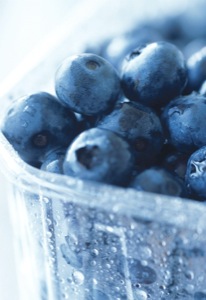-
- Same-sex marriage foes quiet but not to be discounted
- Lawmakers close teacher license loophole
- Senator apologizes for polygamy comments
- New policy for transgender kids in NY juvenile jails
- Transgender rights spread, but opposition mounts
- Advocates file to keep marriage ban off ballot
- National News Briefs
- World News Briefs
dining out
Recipe Box
Better blueberries than blue balls!
Published Thursday, 26-Jun-2008 in issue 1070
It seems lately we have been inundated with the benefits of antioxidants, and the importance of eliminating free-radicals in our diet.
We’re told that if we want to grow old gracefully (what gay doesn’t?) we should protect ourselves from the harmful effects of oxidation of our tissues. Researching that topic, I discovered several lists from prominent healthy lifestyle advocates. Blueberries are on each of the lists of the top 10 foods you should eat every day. From Dr. Oz (Oprah’s Guru) to Andrew Weil, everyone is singing the praises of the little blue marvel.
With flavors that range from mildly sweet to tart and tangy, blueberries bursting with nutrition and flavor, and are low in calories. Blueberries are at their best from May through October when they are in season.
Recently, researchers at Tufts University analyzed the antioxidant capabilities of 60 fruits and vegetables. Blueberries came out on top, rating highest in their capacity to destroy free radicals.
Extracts of bilberry (a cousin of blueberry) have been shown in numerous studies to improve nighttime visual acuity, and promote quicker adjustment to darkness and faster restoration of visual acuity after exposure to glare. This research was conducted to evaluate claims of bilberry’s beneficial effects on night vision made by British Air Force pilots during World War II, who regularly consumed bilberry preserves before their night missions. This may come in handy for you men who like to cruise the dark rooms of bars.
We’ve also heard drinking a glass of wine a day is good for cardiovascular health. While that is true, eating a handful of blueberries is 34 percent better than drinking a glass of wine, according to one study, and is a much better choice for those in recovery.
When shopping, choose blueberries that are firm and have a lively, uniform hue, colored with a whitish bloom. Shake the container, noticing whether the berries have the tendency to move freely; if they do not, this may indicate they are soft and damaged, or moldy. Avoid berries that appear dull in color or are soft and watery in texture. They should be free from moisture, because the presence of water will cause the berries to decay. When purchasing frozen berries, shake the bag gently to ensure that the berries move freely and are not clumped together, which suggests they have been thawed and refrozen.
Ripe blueberries should be stored in a covered container in the refrigerator where they will keep for about a week, although they will be freshest if consumed within a few days. Don’t wash berries until you’re ready to eat them; washing them will remove the bloom that protects the berries’ skins from degradation. If kept out at room temperature for more than a day, the berries may spoil.
This following recipe is one my partner Dan discovered, and I just love it! Sometimes I will add a scoop of vanilla protein powder to it for a quick breakfast, or a post-workout snack. Enjoy!
If you’d like to share your suggestions, ideas or recipes, please contact me at gltrecipebox@gmail.com.
Blueberry-banana batido
Refreshing and colorful fruit smoothies called batidos are served at Cuban snack bars all over Florida. Buttermilk is basically cultured lowfat milk and has a similar taste to yogurt.
Ingredients
1 ripe banana, peeled and cut into chunks
1/2 frozen blueberries
1 tablespoon sugar
4 ice cubes
1 cup buttermilk
Preparation
Combine all ingredients in a blender and blend until smooth.
|
|
Copyright © 2003-2025 Uptown Publications


